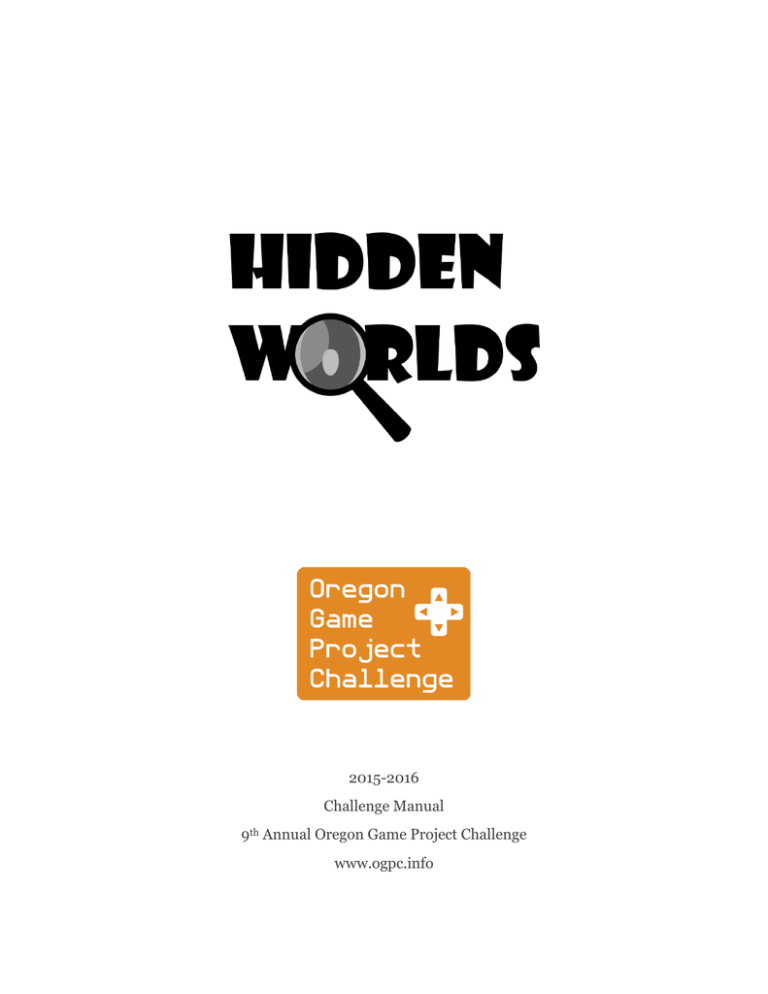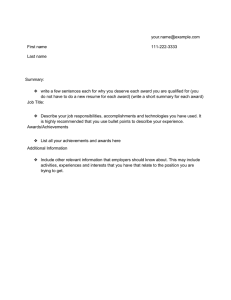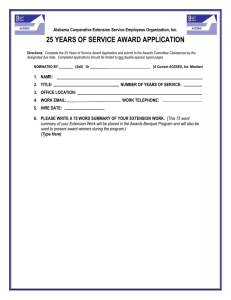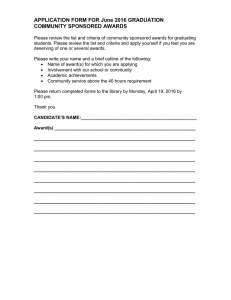
2015-2016
Challenge Manual
9th Annual Oregon Game Project Challenge
www.ogpc.info
2
Summary
Theme Statement
Within our world, there are countless things we cannot perceive (or perhaps that we
choose not to). Within these gaps of our perception are Hidden Worlds that might be
revealed if only we were able or willing to see them.
Overview
This year in OGPC, teams will craft games that explore one or more hidden worlds. It
will be up to teams to decide exactly how to interpret the theme. This interpretation can
be as literal or figurative as desired. Teams can create whatever sort of game they like,
but should strive to make their interpretation of the theme evident in all aspects of their
game. The gameplay, story, art, sound and music all should work together to help the
player experience a Hidden World.
Details
All around us are a wide range of things that are normally invisible.
The micro- and nano-realms hold all sorts of things, ranging from viruses and cells to
fundamental particles and human created nanostructures. Interesting interactions are
constantly taking place all around and inside of us at a scale too small to normally
notice.
Things don’t have to be small to be hidden, though. Our surroundings are filled with
invisible, encoded, or abstract information we cannot access. What if people could see
information bouncing around on cellphone networks? What if people could see the
wavelengths of radiation that pass through solid objects? What if people could hear
what others were thinking?
Think about all the things that are hidden from us. Each of those represents an entire
new world that we could potentially explore. In the brainstorming process, ask: “What
makes this hidden world interesting?”, “How could we develop the interesting features
about this world into actions and challenges in a game?”, “How could we show this
world to players?”
Scoring
It is easy to create a game set in a hidden world, but what makes a great (high scoring)
game? Think about what it means to be small, or to see hidden things. How would
gravity or vision change? Are special tools necessary: microscope, spectrometer,
nanoparticles? Does the player jump on sound waves or skip between cells? Do not
Oregon Game Project Challenge, www.ogpc.info
©2015 OGPC, All Rights Reserved
3
picture the game world solely in terms of story, images, or sound effects (although they
are also critical!), instead, think about how gameplay is different. Think about goals,
tools, enemies/obstacles, to ensure that everything reflects the game world.
Think about it this way. One potential idea would be to create a game in which certain
areas of the level cause you to shrink down and interact with miniature objects. This
might look very cool, but doesn’t necessarily integrate the theme in the gameplay .
However, if the player could go back and interact with objects which were formerly
normal-sized but are now huge immovable obstacles, this would be an interesting
gameplay element inspired by the theme.
Make a game where the rules, story, environment, and player choices all support your
hidden world! Be as creative as possible and do lots of brainstorming. Make something
great!
Goals
1. To build a game that explores the concept of Hidden Worlds.
2. To meet as many of the OGPC achievements as possible.
3. To make it fun! Even if the finer details of making a game are difficult, it is
important to make it fun and keep users engaged.
Specifications
1. Students are encouraged to make a game for whatever platform they have access
to, whether it be iOS, Android, Windows, NES, or TI-84.
2. The term "game" is not strictly defined. Teams need not worry about what other
people think is or is not a game. Teams will explain their game to the judges and
share their vision.
3. Games must incorporate the theme. Judges appreciate creative interpretations of
the theme that lead to interesting ideas, but understand that no amount of
creative explanation can make Call of Duty Zombies fit the theme.
4. Games must be school-appropriate.
5. Teams must respect copyright law. All assets (primarily graphics and sound) used
in games that were not created by the OGPC team for this year’s event must be
listed with the source and what license they are available under in the game’s
credits or another document. Check our website for a list of resources where free
assets are available. Be advised that “Google image search” is not a source.
6. Games do not have to be finished. Most OGPC achievements require at least a
basic, functioning, digital prototype, but a finished and polished product is not
necessary to do well.
Oregon Game Project Challenge, www.ogpc.info
©2015 OGPC, All Rights Reserved
4
Judging: Scoring Summary
Overview
Games will be evaluated at the main event by a panel of judges. Judges will look at 5
aspects of the game to determine a score: Programming, Game Design, Art and Assets,
Theme and Style, and Professionalism. All of these aspects are important to any game,
and we encourage teams to work to meet as many achievements as possible. Earning
achievements grants points, which will help the judges determine the winners in each
category. In addition to the category awards, there are also several main awards given to
teams that display outstanding work in all categories.
Middle School and High School teams compete in separate divisions. Thus, each award
will be granted to a middle school team and a high school team.
Each team can only win one award. In the event that a team is the top contender for
multiple awards, it will receive the first award in the order listed below, and other teams
will be considered for the remaining awards.
Main Awards
The main awards are given to teams that create truly outstanding games. Winning one
of these awards implies outstanding work in all categories. Each award winner is
carefully selected and judges will revisit teams to ensure that awards are given .
Best in Show
This award goes to the team that created the best game, considering all categories
equally. Games that receive Best in Show excel in all categories, usually holding
the top score in at least one.
Judges’ Choice
This award is given entirely at the judges’ discretion. It could be to break a tie or
to recognize a noteworthy game that did not receive an award for whatever
reason. This award could also go to a game that the judges thought was really fun
or technically impressive regardless of performance in other areas.
Rookie
This award goes to the highest ranking new team (coach and all team members
have not participated in OGPC before). Returning teams often know what they’re
doing from the start, however new teams may need a few months to get a rhythm
down. This award recognizes the hard work of a new team that still manages to
shine.
Oregon Game Project Challenge, www.ogpc.info
©2015 OGPC, All Rights Reserved
5
People’s Choice
This award goes to the game that the students voted on during the Main Event.
The game doesn’t have to have won any other awards to be eligible for this award.
As long as the people speak, they will be heard! Students are allowed to vote for
up to three games as the Main Event goes on and the judges tally them all up at
the end to see who won this award.
Category Awards
The five categories are intended to cover all of the important parts of a game. Within
these categories, teams will find a wide variety of achievements to ensure a wellrounded game. Teams are awarded a Category Award to recognize hard work in one
realm of game design and creation. The following is a basic overview of each category:
Programming
This category focuses on the technical side of creating a game. Games winning
the Programming Award display responsible development practices and
significant technical knowledge. Choice of platform or programming language
does not matter, since all major game-making tools support common
programming standards such as use of functions, source control, and
documentation.
Game Design
This category focuses on the process of designing a game. Judges look at game
mechanics, design documents, and prototypes to see how a team’s game evolved
and grew over time. The achievements take into account that this is not a process
many students have gone through before.
Art and Assets
This category focuses on the way a game looks and sounds, such as sound effects,
music, animations, models, and sprites. Judges award more points to teams that
create their own assets; however, teams are allowed to use outside assets that are
free and publicly licensed (for instance, under Creative Commons). Teams may
not commission assets for their game. Teams must provide a list that identifies
where assets were obtained and what license they are being used under.
Theme and Style
This category focuses on this year’s theme: Hidden Worlds. Judges will evaluate
teams on their attempt to follow the theme as they interpret it through game
mechanics, art and story. Judges score teams higher for having a consistent story,
character development, and for communicating the theme through mechanics
and gameplay rather than only intro, cut-scenes, or static images with text.
Oregon Game Project Challenge, www.ogpc.info
©2015 OGPC, All Rights Reserved
6
Students are encouraged to think outside the box and find creative ways of
expressing the theme.
Professionalism
This category focuses on students’ interactions with each other and with other
teams. This award recognizes teams that demonstrate how all members
contributed to the development process, demonstrate extensive playtesting, or
have an active social media presence. Teams should strive to have a professional
presentation and to be respectful of others at the Main Event. Reaching out to
other teams (through Facebook or Reddit, for example) to offer help is a great
way to show professionalism.
Achievements
Games are scored at the main event via achievements. Each achievement has a point
value which contributes to a single scoring category. The full achievement list will be
released as soon as possible, so make sure someone on each team is on the email list! In
the meantime, here are some of the achievements to take into account:
Use source control, or backup multiple versions of your source code and other
documents on a server (e.g. Git, Google Drive, OneDrive, or your school server).
Comment or otherwise document the code.
Write a design document.
Show updates to the design document that reflect changes in your design.
Show off a paper prototype of your game (a picture is okay).
Use a consistent graphical and audio style.
Story is shown through means other than text or static images.
Describe what each team member contributed to the project.
Get people outside the team to playtest your game.
Maintain a development blog or social media page.
Finish and release your game online before the day of the Main Event.
Oregon Game Project Challenge, www.ogpc.info
©2015 OGPC, All Rights Reserved
7
Teams: Makeup and Sizing
Overview
Teams are an important part of OGPC. Teams allow students to split work up and
produce a better game. Many achievements focus on having a well-balanced team.
Students are encouraged to work together to create something awesome!
Team Sizes
Teams work best with somewhere between 2 and 8 people, although no hard limits are
enforced. Solo teams will have difficulty with many achievements, particularly in
Teamwork. Very large teams may not be able to manage work very effectively, and
should consider splitting into smaller teams. No one should feel discouraged from
participating in OGPC but it is important to understand that doing this alone or with a
huge team could bring more trouble than it is worth.
Team Makeup
Successful teams will have an artist, sound person (music and sound effects),
programmer, and a writer, although there are many other roles that could be of great
help in creating a game. If students are trying to form a team and cannot find someone
to be a writer or artist or some other role, this does not mean that the students are
unable to compete – they’ll just have to focus on the roles they can fill and try to get the
category awards they are still able to get. If a team cannot find an experienced
programmer, there are many visual tools and online tutorials to help someone step up to
fill that role. The ideal team uses their strengths to create something amazing and
supplements their weaknesses with resources from other sources.
School Affiliation
Teams are not required to be affiliated with a school. School affiliation can make it
easier for teams to find a coach, volunteers, or meeting space but it’s not necessary. All
interested students are encouraged to form a team. Some teams form through local
organizations such as 4H, Boys'/Girls' Club, or a local library. Others are independently
organized teams. Looking for a team or a coach in your area? Let us know at
info@ogpc.info.
Oregon Game Project Challenge, www.ogpc.info
©2015 OGPC, All Rights Reserved
8
Main Event: What to Expect
Overview
The Main Event is where students get to show off their creations to other students,
parents, judges, and industry professionals from all over the state. Students are
encouraged to walk around the event to see other games, although they should take
turns staying to present their game. When being judged, students should present what
they contributed as well as guide the judges through the most interesting parts of their
creation.
Judging and Demoing
Students are required to bring whatever hardware and software is required to play their
game: Mac, Windows, iOS, Oculus Rift, or custom hardware. Teams should not count on
anything being available for use other than power. Judges will also want to see code, so
if a team is showing off a mobile app or something similar make sure a computer with
the development environment is also present.
Students are not required to move their setup during the event, but teams need to be
ready to present their game to the judges and to other teams that drop by. Teams should
always be ready to help someone play a level or talk about the game. Everyone has
worked hard – now show off!
Age Levels and Fair Judging
Teams compete in separate Middle School and High School divisions at the Main Event.
First-year teams at either level are eligible for a special “Rookie” award in addition to
the other categories. Teams are encouraged to focus on whatever judging category they
are best equipped to deal with. The different category awards allow for teams with
outstanding work in only one or two categories to still win an award.
Oregon Game Project Challenge, www.ogpc.info
©2015 OGPC, All Rights Reserved
9
Sponsors: A Big Thank You!
Award Sponsors
Launch Sponsors
Special Thanks
Oregon Game Project Challenge, www.ogpc.info
©2015 OGPC, All Rights Reserved



